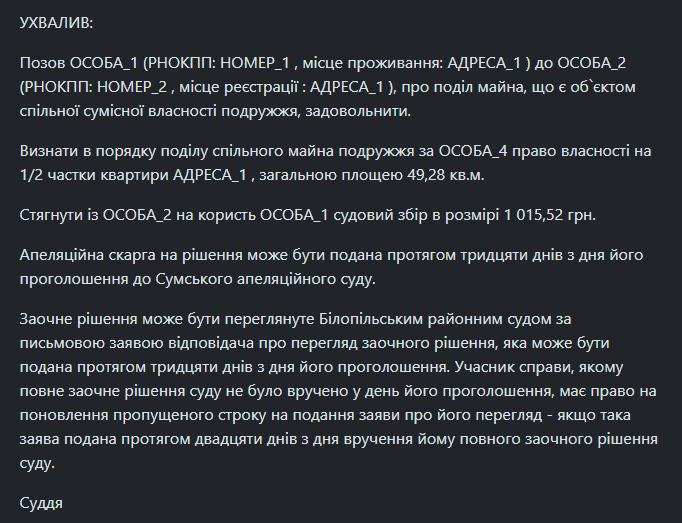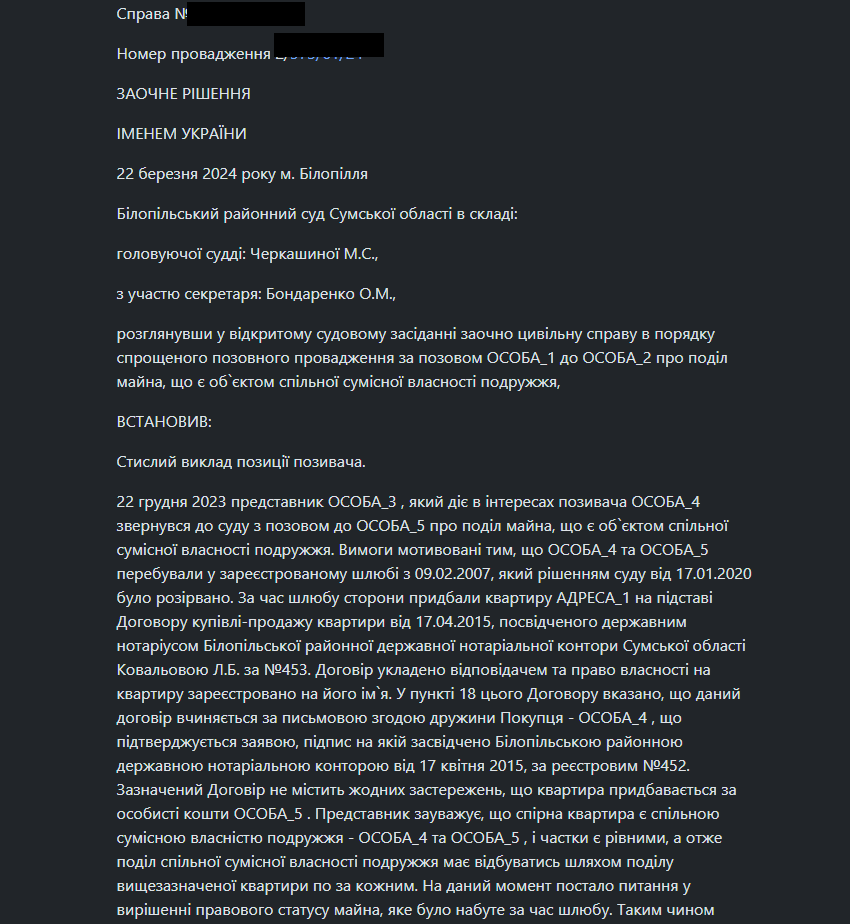My name is Anna Leus, and I am a lawyer with 20 years of experience in providing legal services to businesses. I specialize in tax, commercial, and corporate law, as well as in matters related to business organization and management, the preparation of CFC reports, and family disputes. I work with both businesses and individuals. Personal slogan: There are no unsolvable cases.
Input Data: The client approached the lawyer for help in resolving the issue of asset division after the divorce. The couple had been married for 10 years and had accumulated a significant amount of joint property during this time, including real estate. As a result of personal disagreements, the couple filed for divorce, but serious disputes arose regarding how to properly divide the property. The husband, in particular, insisted that some of the property acquired during the marriage belonged to him, and the wife should receive only what he deemed necessary.
Case Issues: The main issue in this case was the division of property, as there were disputes between the couple regarding which property should be divided and in what proportion. The husband disagreed with the wife’s opinion on the equal division, and as a result, he resorted to manipulation, trying to conceal some of his assets. The distribution of real estate, which they had purchased together, and the division of money in accounts was particularly complicated.
Defense Actions:
- Analysis of the situation and defense strategy planning.
The client's lawyer conducted a detailed analysis of the assets and liabilities at the time of the divorce. Based on this, a clear defense strategy was developed, including providing documentary evidence of the client's property rights. - Preparation and filing of the claim.
After collecting all the necessary documentation, a claim was filed with the court demanding an equal division of property between the spouses. An important element of the claim was providing evidence that the property was acquired during the marriage and belonged to both parties. - Gathering evidence.
In preparing for court, the lawyer, together with the client, gathered all the necessary evidence, including property documents, sales contracts, bank statements, receipts, and witness testimonies about the time and manner in which the property was acquired. The wife submitted additional testimony to the court confirming that some of the property had been acquired with her personal funds before the marriage. - Negotiations with the husband.
In an effort to reach a peaceful settlement, the lawyer organized several rounds of negotiations with the client's husband. During the negotiations, an agreement was reached on partial compensation for the value of the property, which would compensate for some of the expenses and create conditions for a more peaceful resolution of the conflict. - Representation in court.
During the court hearing, the lawyer represented the client’s interests, providing relevant legal arguments regarding the equality of rights to jointly acquired property. The lawyer emphasized to the court the violations made by the husband, who had attempted to conceal part of the property.
Outcome of the Court Process:
Thanks to the professionalism of the lawyer and the well-structured strategy, the court made a decision in favor of the client, which contributed to a more equal division of property. As a result of the court process, it was decided:
- To divide the real estate equally, including the apartment that was purchased during the marriage.
- To charge the husband additional compensation for the court fees.
Lawyer’s Involvement:
The lawyer played a crucial role in the case, helping to gather all the necessary documents and expert opinions, as well as preparing the defense of the client’s interests in court. Thanks to his efforts and professional strategy, it was possible not only to divide the property but also to preserve the peaceful relationship between the spouses, which helped avoid further conflicts and unnecessary legal expenses.
Legal Aspects of Property Division in Divorce:
Legal Framework:
According to the family legislation of Ukraine, in the case of divorce, the spouses have the right to an equal division of jointly acquired property. However, there are certain exceptions, such as when the property was acquired before the marriage or is considered the individual property of one of the spouses.
Property Valuation:
An important component of property division is its valuation. This is usually done by an independent appraiser who considers the market value of the property at the time of division. In this case, the valuation was carried out by several independent experts, which helped avoid manipulation of the property’s value.
Division of Debts:
When dividing property, it is also necessary to take into account the presence of joint debts. These are divided proportionally to each spouse’s share. In this case, the husband's accounts revealed significant debt from credit obligations, which also influenced the property division.
This case highlights the importance of a professional approach to property division in divorce. The successful outcome was achieved thanks to a well-developed strategy, properly gathered evidence, and qualified representation of interests in court. Such cases can be complex and prolonged, but with the right legal support, a fair decision can be reached for both parties.






























